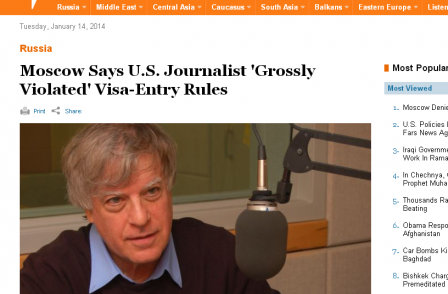
For the first time since the Cold War Russia has expelled a US journalist after deeming him “undesirable”, the Guardian reports.
David Satter, 66, former Moscow correspondent for the Financial Times, had reportedly been based in Russia since September and previously resided in Moscow between 1976-82.
The Guardian reports that Statter travelled to Kiev, Ukraine, last month to renew his visa where he was read a message from a diplomat at the Russian embassy which stated: “Your presence in the opinion of the competent organs [Federal Security Service, FSB] on the territory of the Russian federation is undesirable and you are barred re entering into Russia.”
In a video interview with the Guardian he said: “This is the first time that an accredited American correspondent has been expelled from the country.
“The Russians are focused at the moment in improving their image…it doesn’t make sense that they would ruin their image to a certain degree by taking such an action against free speech and against openness to the outside world.
“It was typical during the Soviet period to accuse foreign correspondents of being spies but to make a direct accusation of that kind to a journalist in post Soviet Russia is in fact extremely rare.”
He continued: “It was explained to me frankly that this was at the behest of security organs and that it was not a matter of my having done something, no accusations were made against me, it was statement that my presence on the territory of the Russian Federation was undesirable. So we see a tendency toward a return to cold war tactics and even beyond.”
Satter had been working for Radio Liberty/Radio Free Europe (RL/RFL) in Moscow.
RL/RFEurope President Kevin Klose said in a statement yesterday: “The U.S. Embassy in Moscow has been informed of the action against Satter and has lodged a formal diplomatic protest with the Russian Foreign Ministry.”
Radio Free Europe reports: "The Foreign Ministry said in a statement that Satter stayed in Russia over the period permitted by law and has been banned from entering Russia for five years."
Email pged@pressgazette.co.uk to point out mistakes, provide story tips or send in a letter for publication on our "Letters Page" blog
